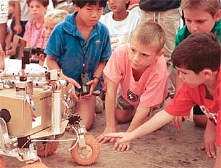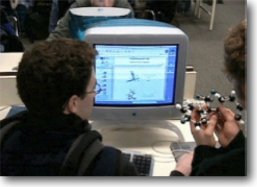The following projects are currently active among members of the group. Papers and presentations can be found on our research page.
 Documenting young people's everyday encounters with science and technology (all group members participating, Bell directing): We have numerous accounts of children's science learning and technology use in classrooms, but significantly less research on how young people's everyday experiences influence how they learn science and use technology. In this study we explore the question: In what activity contexts are science and technology encountered in everyday experiences, and how do these encounters influence young people's understanding of science and their fluencies with technology? This study is a multi-year, ethnography in three communities of fourth graders, their families, and their friends. We are attending to the overlapping conceptual dimensions of everyday science, technology, and argumentation. The ethnographic cases will ultimately be used to inform subsequent design experimentation research in classrooms.
Documenting young people's everyday encounters with science and technology (all group members participating, Bell directing): We have numerous accounts of children's science learning and technology use in classrooms, but significantly less research on how young people's everyday experiences influence how they learn science and use technology. In this study we explore the question: In what activity contexts are science and technology encountered in everyday experiences, and how do these encounters influence young people's understanding of science and their fluencies with technology? This study is a multi-year, ethnography in three communities of fourth graders, their families, and their friends. We are attending to the overlapping conceptual dimensions of everyday science, technology, and argumentation. The ethnographic cases will ultimately be used to inform subsequent design experimentation research in classrooms.
Understanding how young people engage with and produce everyday arguments (Bricker): This study documents the arguments young people encounter and employ across various settings (e.g., playgrounds, shopping malls, houses of worship, science museums, restaurants). We are studying young people’s everyday arguments with attention given to the social, material, and cultural context associated with their argument activity. This research is focused on better understanding the structural forms and interactional practices associated with argumentation that young people employ naturalistically for their own purposes.
 Discerning students' understanding of argument through an analysis of their classroom talk and action during debate instruction (Bell, Bricker, McGaughey): This study explores student’s understanding of the nature and purposes of scientific argumentation while under instructional conditions associated with heavy socio-cognitive scaffolding. This study will produce a participant account of a two-week period where middle school students were engaged in a scientific debate and argumentation project.
Discerning students' understanding of argument through an analysis of their classroom talk and action during debate instruction (Bell, Bricker, McGaughey): This study explores student’s understanding of the nature and purposes of scientific argumentation while under instructional conditions associated with heavy socio-cognitive scaffolding. This study will produce a participant account of a two-week period where middle school students were engaged in a scientific debate and argumentation project.
Engineering students' ideas about the life sciences (McGaughey): This exploratory study is documenting the images of the life science held by engineering undergraduates studying in relevant subfields. This research is being conducted in affiliation with the Center for the Advancement of Engineering Education (CAEE).
The CAEE Center aims to develop a more comprehensive understanding of the processes of becoming an engineer. The focus of this study is on the images of life science encountered by engineering students and how the understanding of those images might impact the decision to follow a course of engineering study and develop relevant knowledge and expertise of the field. This work stands to inform the recruitment and retention of engineering students interested in working across disciplines. Additionally, this work will ultimately inform engineering education interventions by revealing how best to understand the influence of student's existing understanding of life sciences on students' learning processes and how we might be able to leverage their understanding of the life sciences in formal learning experiences.
Enginering student's technological fluencies and social practices (Bell, Zimmerman): We know relatively little about how undergraduates are making use of digital technologies in the fabric of their everyday life activities. Most of the behavioral research has focused on academic uses. This exploratory study is documenting the everyday uses of digital technologies by engineering undergraduates. Since these are students developing expertise in technology-related fields, they potentially represent a group of heavy technology users that highlight social practices and technological fluencies that might become increasingly widespread among young adults. This research is being conducted in affiliation with the Center for the Advancement of Engineering Education (CAEE).
 Teen's online social practices (Zimmerman): This study investigates adolescents' out-of-school technological activities as social practices in order to understand how they make sense of everyday technologies for their own purposes. The focus is in on teens' practices around the Internet and instant messaging to document how they have found that these networked information and communication technologies influence family time, family social practices, teen socialization, technological fluencies, online community, expectations for school education, and learning.
Teen's online social practices (Zimmerman): This study investigates adolescents' out-of-school technological activities as social practices in order to understand how they make sense of everyday technologies for their own purposes. The focus is in on teens' practices around the Internet and instant messaging to document how they have found that these networked information and communication technologies influence family time, family social practices, teen socialization, technological fluencies, online community, expectations for school education, and learning.
Understanding family learning in science museums (Zimmerman, Reeve): This research project examines the discourse and interactions that occur when families visit science centers. We consider the processes that families use to make sense of science center exhibits about the living world, including live animal habitats, robotic animal displays, and interactive exhibits about the human body. We adopt a theoretical framework where conversations contain evidence of learning processes. We analyze these conversations for families' ideas/statements, theories, questions, and evidence used in their explanations. We consider non-verbal gesturing and pointing as an integral part of the meaning-making process.



